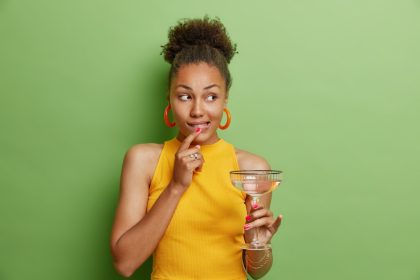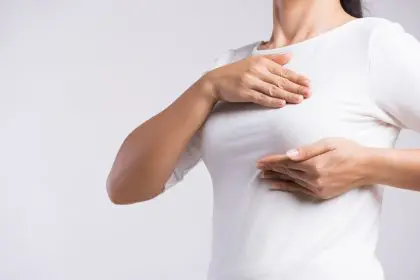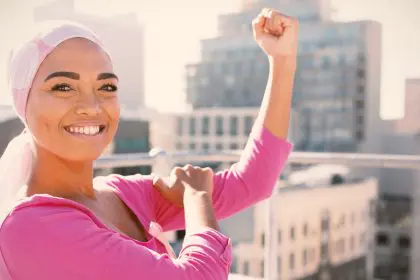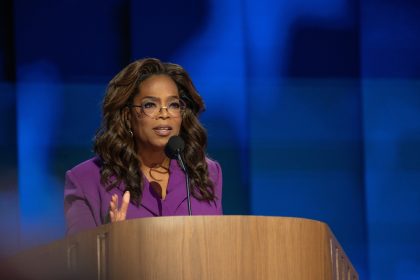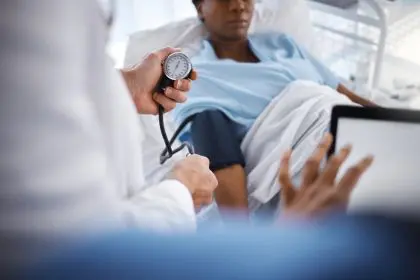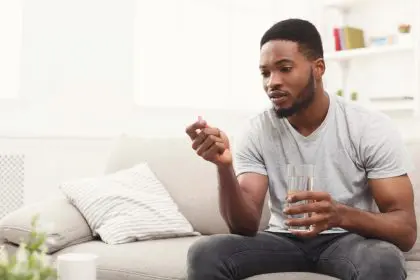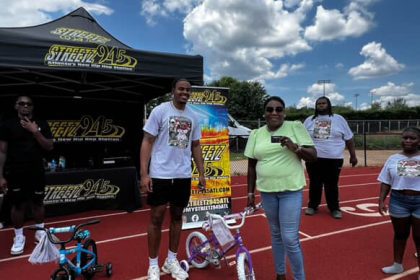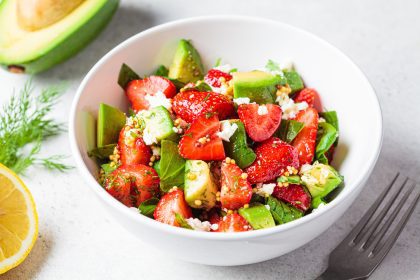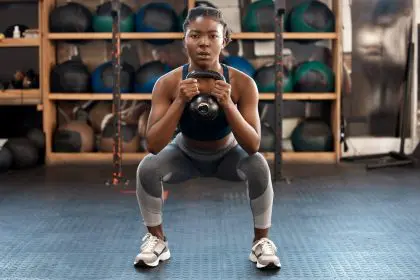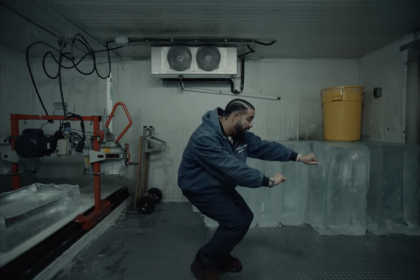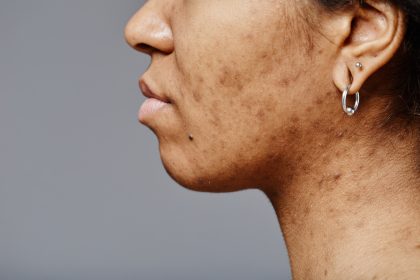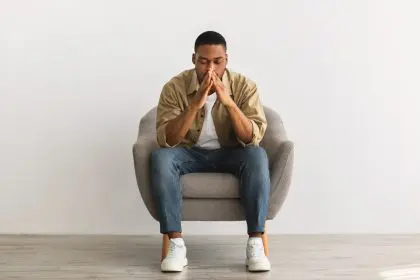
Ricki Fairley was a busy professional juggling a multitude of tasks simultaneously prior to being diagnosed with breast cancer. Here, she talks about her battle and what every woman should know about this insidious disease.
What do you want all women diagnosed with breast cancer to know?
Breast cancer is not preventable but early detection is critical. About one in eight U.S. women (roughly 12 percent) will develop invasive breast cancer over the course of her lifetime. However, according to the CDC, in women under 45, breast cancer is more common in African American women than White women. Overall, African American women are more likely to die of breast cancer. The breast cancer death rate for women aged 45-64 years was 60 percent higher for Black women than White women. And, breast cancer is the most commonly diagnosed cancer among African American women. Lastly, many women believe that if they don’t have a family history with breast cancer, they are safe. That is not true. Only 5 percent of breast cancer is hereditary meaning that 95 percent is not. African American women are more likely to get aggressive forms of breast cancer than anyone else, like TNBC [triple negative breast cancer]. Black women are more like to carry the breast cancer genes: BRCA1 (BReastCAncer gene one) and BRCA2 (BReastCAncergene two).
Why are Black women different?
Our tumors often are found at a later, more advanced stage. So, there are fewer treatment options.
We often distrust of the health care system or may not have health insurance. We often have dense breast tissue which makes diagnosis more difficult and requires more extensive testing
We are more likely to get TNBC.
We are more likely to take care of others at our own expense.
Describe your state of mind on the day you were diagnosed with breast cancer.
The craziness actually starts when you identify the lump, which takes you into the diagnosis process. I was your typical Type A Black woman superhero of the world taking care of everything as a partner in a marketing agency, a mom to two daughters, a daughter working 24/7 trying to conquer the world and make a difference. I actually call Black women “Miracle Workers” because we give our all to everyone in our worlds every day. And often at the expense of ourselves. So I raced from my office to my doctor for my annual checkup and she found the lump. She told me it looked suspicious but I was so busy trying to get to my next conference call I just get on going with my day. She told me the nurse would call to schedule my mammogram and a sonogram within a week. They called within the hour. I still ignored it because it meant more time away from work. I went the next day for the tests and they said they would call within a week with the results. Well, they called within the hour and said your biopsy is scheduled for tomorrow at 4. At that point, I started thinking this could be serious but frankly I was having 10 people over for dinner that night and I was more worried about marinating the salmon.
So the next day, I raced out of the office to make it to the biopsy in time, all the while trying to talk an irate client off the ledge on the phone. I got to the doctor’s office, my youngest daughter, Hayley, 19, was there waiting for me, grabbed my phone, turned it off and said “Mom, do you realize what we are doing here?” It started to hit me then that something may actually be wrong. The doctor’s reaction and facial expressions during the biopsy were a bit scary. She said she would call in four to five days. The next day, Hayley and I got on a plane to Dartmouth to take her back to school for fall term. It was the beginning of a two-week trip I planned and was going from there to the West Coast. The doctor called three days later as I was going through security in the Boston airport. “Yes Ricki, you do have breast cancer. The pathology doesn’t look good and you should probably cancel your trip and come home.” I was in shock as I flew for the next five hours to San Francisco. No, I did not go home. I said, “OK God, what are we going to do about this? I have a lot of people depending on me so please tell me what to do.” I returned home a week later to deal with it to find out that I not only had breast cancer but I had the most fatal kind, triple negative breast cancer. And I was stage 3A. After my mastectomy, I had my first meeting with my oncologist and she gave me two years. I told her that she, I and God would have to work something out because my baby daughter was a sophomore at Dartmouth and I not only wanted to see her graduate but I had to work to pay for her education. I also wanted to see my older daughter, Amanda get married. I just celebrated year four of Thrivership! Hayley is an awesome first grade teacher and Amanda recently married. God had another plan for me.
What is Triple Negative Breast Cancer?
Triple-negative breast cancer is a subtype of breast cancer that lacks the three important hormone receptors that are used as targets for cancer treatment. These receptors are important because they reveal where the cancer is most vulnerable and help determine how to best treat it. Since triple-negative breast cancer lack the presence of all three of these receptors, this subtype of breast cancer is more difficult to treat and more likely to recur. It is the only type of breast cancer that has no targeted therapy to prevent recurrence. That’s why I call Triple Negative Survivor/Thrivers special — we have to have Triple Positive attitudes to fight our disease.
What was your health regimen prior to your diagnosis? What is it now?
I am a pretty healthy and fit person. At the time, I had a pretty strong cycling regimen of three to four times a week. Steak and ice cream were my foods of choice but generally I was pretty healthy. Now I still cycle about the same rate. I teach a dance ministry of kids ages 3-15, and paddle board every morning I can. I gave up red meat as there is a lot of data that it is connected to breast cancer recurrence. I still eat ice cream pretty much every day and my doctor says even though it comes from the same animal as the steak, it’s OK.

What changes to your daily routine have you made that reflect the new awareness and experience with breast cancer?
First, let me explain the changes I made to my life overall. I actually quit my life and started a new one. I realized I had to get all of the cancers out of my life, not just the one in my breast. I also realized I had created dependencies that were not healthy. I ended my stress-filled marriage and divorced my husband of 30 years. Ouch! I separated from my business partners of 10 years. I sold my house in the suburbs and moved to the beach. I started my own business between my 3rd and 4th rounds of chemo so I could have more control over my daily life. I learned what stress feels like at the cellular level and remove myself from any situation that even begins to seem stressful. With regard to my daily routine, I find peace in my life every day. I have a dance party everyday whether it’s in my house, my car, my church or the street but I dance everyday. I recite a wonderful affirmation, The Power Living Pledge by Teresa Kay-Aba Kennedy. My favorite line is “I seek order, simplicity and peace, creating space for my blessings to increase.” I put the mask on myself first, like the flight attendants say, before I try to help others. My personal hashtags are #WalkingInBlessings and #TriplePositive.
What are the treatments you have received? Provide insight, process and tips for getting through them.
I had a double mastectomy, which I highly recommend. There was a very high risk of recurrence in my other breast because I had Triple Negative. But even if the risk is slight, why take it? Plus, you can get new breasts in any size you want and never have to wear a bra, how cool is that? I then had six rounds of very intense chemo, lost my hair, lost 30 pounds but never lost my faith. That was followed by six weeks of daily radiation. And then four more rounds of chemo. It was not fun. My tips for getting through it are as follows: Stand on your faith. Claim your survivorship the day you are diagnosed. Never go to the doctor alone. There is simply too much information to absorb. You need some one to listen so you can react. Question everything. Get second opinions. Be confident in your medical care. Fight for yourself to get the best care. Take advantage of and live your life on your good days because there will be bad ones. Surround yourself with the people that give you peace. Remove the stress from your life.
How has your body transformed physically since your diagnosis?
I have new breasts that are bigger than the ones that tried to kill me. I recently lost function in my thyroid which the docs say could be a complication of chemo so I do have trouble keeping weight on, something many women appreciate … I had to buy some new clothes in a smaller size, oh well.

There are a lot of books and websites offering information on breast cancer. What resources have served you best?
First and foremost, I believe so strongly in the Triple Negative Breast Cancer Foundation (TNBCFoundation.org) that I now serve on their Board of Trustees. For our disease, they are the only resource with up to date information on the latest research, the specialized doctors and they have a 24/7 discussion forums where women living with TNBC and their families can go for support. They also have toll-free telephone help line that is staffed by oncology social workers trained to handle our specific needs. I also believe BreastCancer.org has great information and LBBC.org (Living BeyondBreast Cancer).
Where do you find the strength in your fight against breast cancer odds?
My faith in God. He is my Rock. I know He has plans for me. I have seen so many women die from the same cancer I had that I now have clarity around my purpose. I know with great confidence, conviction and passion that my purpose in life to make all women, but especially Black women, aware of Triple Negative Breast Cancer and raise money for research for a cure.
Please finish the sentences:
I have changed my diet and exercise routine by …
Taking the time everyday to do something good for my body for I now realize that it is the only place I have to live. I don’t eat red meat or pork. I eat a lot of fruits and vegetables. I eat dark chocolate covered almonds and ice cream just about every day. I walk up and down stairs, avoiding elevators when I can. I paddle board whenever I can.
My support system for managing my breast cancer includes …
From the moment I was diagnosed I was never alone. My mom, my daughters, my sister and my sista friends from all parts of my life banned together such that I was never alone. They knew I would never ask for help so they just took control and never left my side. They drove me to chemo, cooked, cleaned, ran my errands and took care of me. I never wanted for anything. They are my blessing. I started a club of them called SMAD, Sistas Making A Difference. We hang out regularly and have prayer calls every other Sunday to lift each other up.
On my bad days I …
I don’t have bad days. Every day is a gift! I treasure every sunrise, every rainy day, every snow flake, every falling leaf, every sunset.
A good day for me includes…
A great day for me is when I can paddle board into the sunrise. I try to do it as often as possible. I spend as many moments with my daughters and my mom that I can.
When I looked in the mirror during my breast cancer treatment I told myself ….
I will survive!
If you are diagnosed with breast cancer, take these three steps first …
1. Ask God for His plan for you and stand on your faith.
2. Get the best medical care that you can.
3. Fight like a girl everyday!
When you are going through breast cancer treatment, keep your spirits high by…
spending time with the people you love doing the things you love, watch funny movies and tv shows—there will be some days when the “chemo brain” kicks in and you just can’t think clearly so laugh! Praise God with a song and a dance.
I treat every single day like…a precious gift that I treasure. I try not to waste a second.
One More thing: The American Cancer Society recently released new guidelines for checking for breast cancer. They are NOT good for Black women. My awesome breast doctor, Dr. Regina Hampton-Coleman says, “Their new and revised guidelines suggest that women of average risk can start getting screened at age 45. The guidelines have significant life or death implications for Black women, who already have a higher mortality rate for breast cancer than their white counterparts. Here’s what we do know for sure: Black women overall have a lower incidence rate of breast cancer than white women. However, those under the age of 40 have a higher incidence rate.
We know the difference in breast cancer mortality rates between Black and white women is 40 percent.
Black women are on average three to seven years younger than white women when diagnosed. If we look at this latest set of guidelines in light of what we know about Black women and breast cancer, we have to ask how delaying screening and diagnosis is best for black women. These mixed messages could lead to more deaths from breast cancer in our community.”
Dr. Regina Hampton-Coleman recommends the following regimen:
- Monthly breast self-exam (BSE) starting at age 20. Download the Early Detection Plan app and you can set it to get a monthly email reminder to do your self exam….Or follow me on Twitter @RickiDove and I send a reminder on the 20th of every month.
- Clinical breast examination by a trained medical professional every 2-3 years beginning at age 20, and annually after age 40
- Mammography screening every one to two years for women ages 35-40 (If your mother or sister has had breast cancer, you may need to get mammogram earlier and more frequently)
- Annual mammography screening for women age 40+
Follow me on Twitter and Instagram @RickiDove. I will blast out a message on the 20th of every month to remind you to check the breasts that you love. Everyone has at least one pair!








